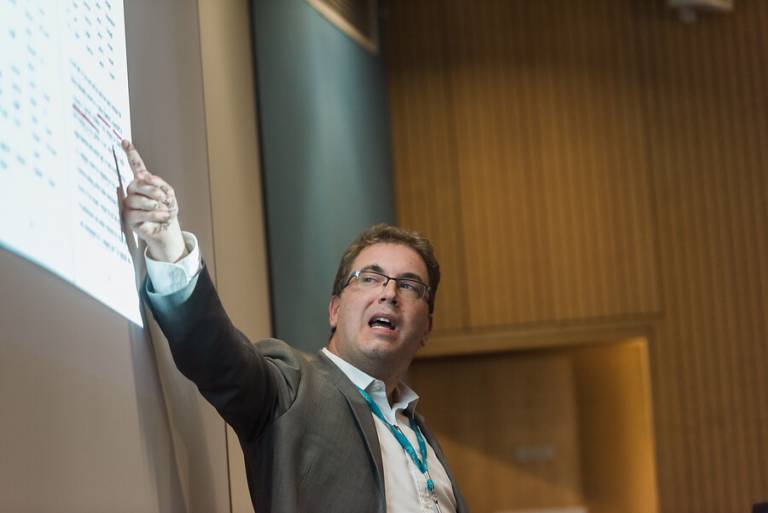On the occasion of his Inaugural Lecture on 27 July, we spoke to Pearse Keane, Professor of Artificial Medical Intelligence at our institute.

Tell us a bit about your work
Although I’m not a computer scientist or an engineer, I’ve come to find myself leading a multi-disciplinary clinical research group which focuses on developing and implementing artificial intelligence (AI) systems in healthcare. We believe that ophthalmology is one of the specialties at the forefront of AI-enabled healthcare and hope that it can be an exemplar for other medical specialties in this regard!
Why is your research important?
Since 2017, ophthalmology has overtaken orthopaedics to become the busiest of all specialties in the NHS in terms of clinic appointments. Nearly 10% of all clinic appointments in the NHS are for vision loss and ophthalmic conditions… and this corresponds to nearly 10 million appointments per year. The unfortunate reality is that this places enormous pressure on our clinics, with some patients losing sight because of delays in being seen and treated. And this is not just a problem in the NHS but globally. I believe that new technologies, such as AI, can play a part in reducing preventable blindness and can do this at a global scale.
What inspires you in your work?
I’ve been very lucky to have had the support and mentorship from many amazing figures. I’ve been particularly inspired by Dr Eric Topol, a world leading cardiologist and researcher based in San Diego. Eric is one of the most highly cited and eminent clinical academics in the world; I was very lucky and privileged to get to know him when he led the Topol Review of the NHS in 2018. He’s written a number of best selling books - one that has particularly inspired me is The Patient Will See You Now. I’ve read this multiple times and almost every other word is underlined! Closer to home within UCL, my main inspiration has been Professor Sir Peng Khaw. He has supported and mentored me since first I first joined Moorfields and UCL back in 2010. Peng is a true visionary who can spot the latest scientific advances years before others, see how they could be incorporated in ophthalmology, and explain their significance in an accessible way to patients and the public.
What has been your most memorable career moment so far?
Working with DeepMind and Google, we developed an AI system capable of diagnosing the commonest retinal diseases - in 2019, we got to do a live demonstration of this system as part of the BBC Royal Institution Christmas Lectures (even better, this was hosted that year by another UCL professor, the amazing Hannah Fry!).
What do you like to do outside work?
I love reading… and so my favourite thing to do outside of work is to hangout with my wife and two daughters in a good bookshop… ideally followed by good coffee and chat!
What book is currently on your bedside table?
I’ve just started reading “House of Glass” by Hadley Freeman, a vivid re-creation of the author's Jewish family's experience of twentieth-century Europe. I recently finished “How the World Really Works” by Vaclav Smil - highly recommended!
Professor Keane delivered his Inaugural Lecture on Wednesday 27 July. You can now watch the recording.
Watch Prof Keane's Inaugural Lecture
Read interview on AI in dementia research
 Close
Close

